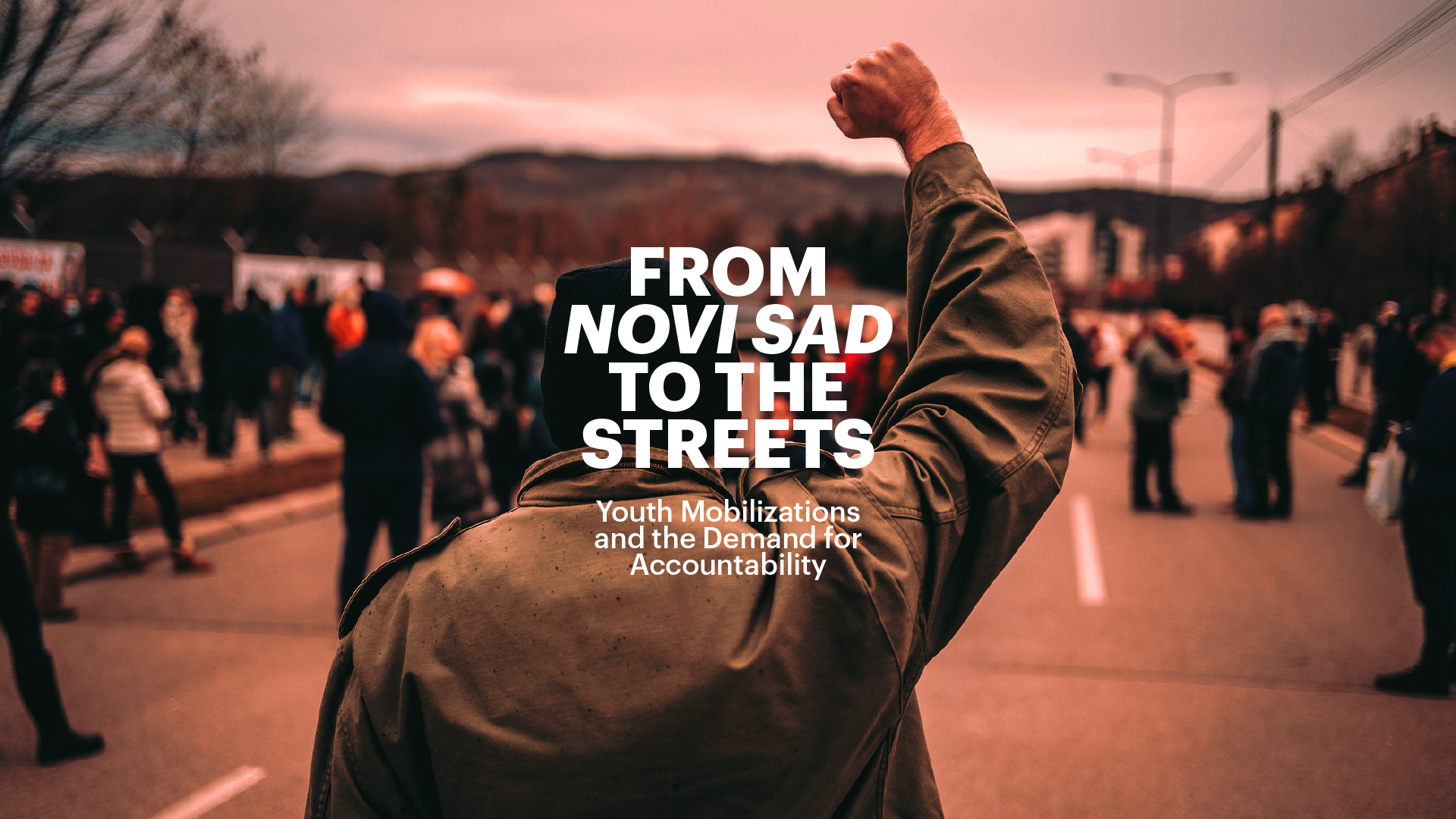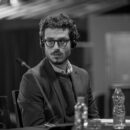
Jelena Vasiljević: We want to have functioning institutions, accountability, rule of law and more democracy
1. The duration of the protests in Belgrade, now over 2 months, and their mass participation is remarkable. What is the cause of the protests taking place in Belgrade? What is fueling the social unrest and mobilizations? And what are the main demands of the protesters?
Τhe immediate cause for the protest was the fall of the canopy in the reconstructed railway station in Novi Sad. You can say that that triggered the protest, but actually the root cause is much deeper. We’ve had massive protests and massive cycles of protests in recent years.
So the frustration with this government and dissatisfaction with this regime is really deep. And we really had different waves of protests. And this is just the latest crisis, you may say, or the latest tragedy. It was one of many tragedies and one of many disasters that happened in this society with no political accountability, with no adequate response from the government. So you have the deeper cause. The deeper root cause is actually this deep dissatisfaction with the regime. But now these protests are led by students. They have their four demands. They want all files regarding the reconstruction of this railway station to be declassified, open to the public. And they want political and legal accountability. They want all responsible persons to be prosecuted. They want everyone who was involved in attacking students and protesters to be prosecuted. Especially because in the first days of protests, it was actually people very closely related to, and members of, the ruling party that were involved in attacking students. The third demand is that all arrested protesters should be freed. And the fourth demand has to do with university education. They demand more money in the state budget for higher education. So these are official demands, but you can see on streets and in the atmosphere that these are more like anti-regime and anti-systemic protests, actually.
2. We noticed that the protests are primarily directed against corruption? How is this related to the initial incident? Why is “corruption” chosen as a central element in the movement’s discourse?
Actually, it is not. It is Western media that was the first that labeled this protest as anti-corruption. So in Serbia, they were never labeled as such. I mean, of course, among protest banners and slogans you can hear shutouts against corruption. But that was never the main issue that protests revolve around. I think it has to do with the fact that Western media were silent about these protests for two months. We barely heard anything about it. And then in the last couple of days and maybe last weeks, we hear Western media reporting on anti-corruption protests in Serbia. I think it’s a way of safely presenting them.
Actually, these are anti-regime protests, no doubt about that. So it is not only about corruption. It is about accountability. Political and legal, accountability. But also it is about the fact that all institutions are completely captured and the state is captured by the ruling party. And that’s what these protests are about. We want to have functioning institutions and we want legal responsibility and accountability. We want, finally, institutions to do their job and we want to have more democracy and rule of law. But it’s not only about corruption. Definitely.
3. Where do we stand at this point? What are the latest political developments after the recent resignation of Serbia’s Prime Minister? We see that despite Prime Minister Vucevic’s resignation, the demonstrations continue and maintain their mass and momentum. What action from the government would satisfy the majority of the protesters?
That didn’t change anything, actually, because that was never demanded. I mean, it was never asked for and students immediately responded. That was never our demand. We didn’t want the government to fail. And you know, we all know that in the country President Vucic is actually the true leader, even though he is, of course, constantly overstepping his constitutional authorizations. But he holds all the power and he is in control of who is in the government and who will resign and who will leave, who will come in the government. So it was never really about that. So that didn’t change anything.
It was a step that the government wanted to, to mimic a concession, you know, to say that we did something, but that didn’t change anything actually.
4. What are the particular characteristics of these protests? How do they differ from previous ones? Are there any innovative elements? Do you notice anything different in terms of the forms of action or their frequency?
Well, despite the fact that we had, as I said at the beginning, many protests over the years, this particular wave took us all by surprise. Because they’re student-led massive protests and demonstrations. So students united basically in all big universities in Serbia. And we were very much surprised because for years we thought of the student population as apolitical, non participatory in political processes. And that was kind of always debated in Serbian society because in ‘96-’97, student protests against Slobodan Milosevic were the hallmark of resistance against his regime. So we were constantly in society lamenting because there is no political action on the side of students. So we were really surprised not only because of the fact that they mobilized, but also because of the way they mobilized. They are so well organized. I mean, they are now participating in the blockades of faculties for more than two months. And they’re very neatly organized. They coordinate well.
They are also escaping this temptation to personalize protests. So we are in a way amazed. And also that mobilized society at large. So we really had some estimates saying that actually the protests in Belgrade a couple of weeks ago were the most massive protests we ever had in recent history, surpassing even the ones that happened on the 5th of October when Slobodan Milosevic was ousted. It was kind of the biggest mobilization this society ever had. So this is really unique. Also another specific characteristic is that they completely refrain from political parties, both the governing parties and the parties in the opposition. So that has to be understood within the context of the very big mistrust that we have in this society. Citizens don’t trust not only political parties that are in power, but they don’t trust opposition political parties. So students are very careful not to make any connection with opposition parties. And opposition parties are supporting the protests, but they’re in the background. And also students are very much observing that they’re in the background. And citizens are sometimes critical if they move more to the center. So this will maybe pose a problem in future because we’ll need to articulate the demands of the protest in political arenas as well.
5. Do you feel a sense of initial justice with the political consequences being recorded in Serbia? Is the lack of political accountability one of the most important problems for the functioning of democracy today? Are mass protests ultimately the only way to hold a government accountable?
I just wouldn’t jump to the conclusion that we had political responsibility in Serbia. So we still don’t have the persecution of responsible persons. So we don’t really have political consequences. The resignation of the prime minister is not one that we are satisfied with. And also, we have to bear in mind that, as I said also at the outset, this was only one in a series of many tragedies and affairs that we had in Serbian society and after which no one was held responsible.
I think that this dissatisfaction with the lack of accountability was just kind of sedimented here in society and now exploded. What happened in Serbia was not that someone took political responsibility. We didn’t have that. So we have actually years of political misbehavior, and also many tragedies. As I said, it was not the first one. And so we didn’t have political responsibility. I think that people are asking for it, but it’s also so much more than that. It’s not only that we don’t have political accountability. It’s also that we don’t have functioning institutions. And people feel that the state is completely owned by the ruling political party and regime. And all institutions are ruled by the regime and by the figure of the president. And people feel completely powerless. We don’t have competent and independent institutions and state institutions that function normally. I think that this frustration is really what triggered this movement. The concentration of power in the hands of one person fueled this rage. And I think the protests are very important. I just feel that they also need a clear political articulation.
Also given the regional and global political circumstances that are going in a direction that we may not necessarily like, you know, this regime was very much supported by both the EU and the United States and also Russia, but that’s another story. But it’s very different from the situation we had during the 90s, for example, when there was a clear consensus that the regime of Slobodan Milosevic is non democratic, and that it’s against democratic freedoms, rule of law, media freedom, etc. With the Vucic regime the situation is different. He’s doing many things that Milosevic was doing as well, but he is supported by the EU because of some economic and geopolitical interests.
6. The people of Greece and Serbia share a common sense of pain and outrage and express solidarity with each other due to these two tragic events. We know that Serbian protesters took part in the recent large-scale demonstration for Tempi in Greece, and that Greek students are participating in and supporting the protests in Belgrade. How significant is this expression of solidarity? What message can we draw from such actions?
I think it is very important that we have this regional solidarity. People in Croatia, in Bosnia and Montenegro, also showed their support. And I think that also with what happened in Greece and with these similarities that we have, I think it is very empowering. It is emotional. It is very important. But I think it’s also maybe politically relevant because we also have to acknowledge that what is happening in our countries has to do with regional, European and global politics. And I think that we need to learn from each other. And I think that we need to understand that certain conditions that made all these tragedies possible and that made all these unaccountable regimes possible, this has to do with some global political climate. And we have to fight it, not independently from each other, but also in concert and in a way of being aware that similar struggles exist in neighboring countries.
*This interview was conducted on 5 February 2025
Jelena Vasiljević is a Senior Research Associate at the Institute for Philosophy and Social Theory, University of Belgrade. Her background is in political anthropology and citizenship studies. Her expertise and research interests include theories of citizenship, citizenship transformations in the post-Yugoslav states, memory politics, civic engagement, and social movements in South-East Europe. Presently, she is primarily interested in theories and practices of solidarity. She was an expert member of The Balkans in Europe Policy Advisory Group (BiEPAG) and she currently sits on the European Alternatives Transnational Board.




